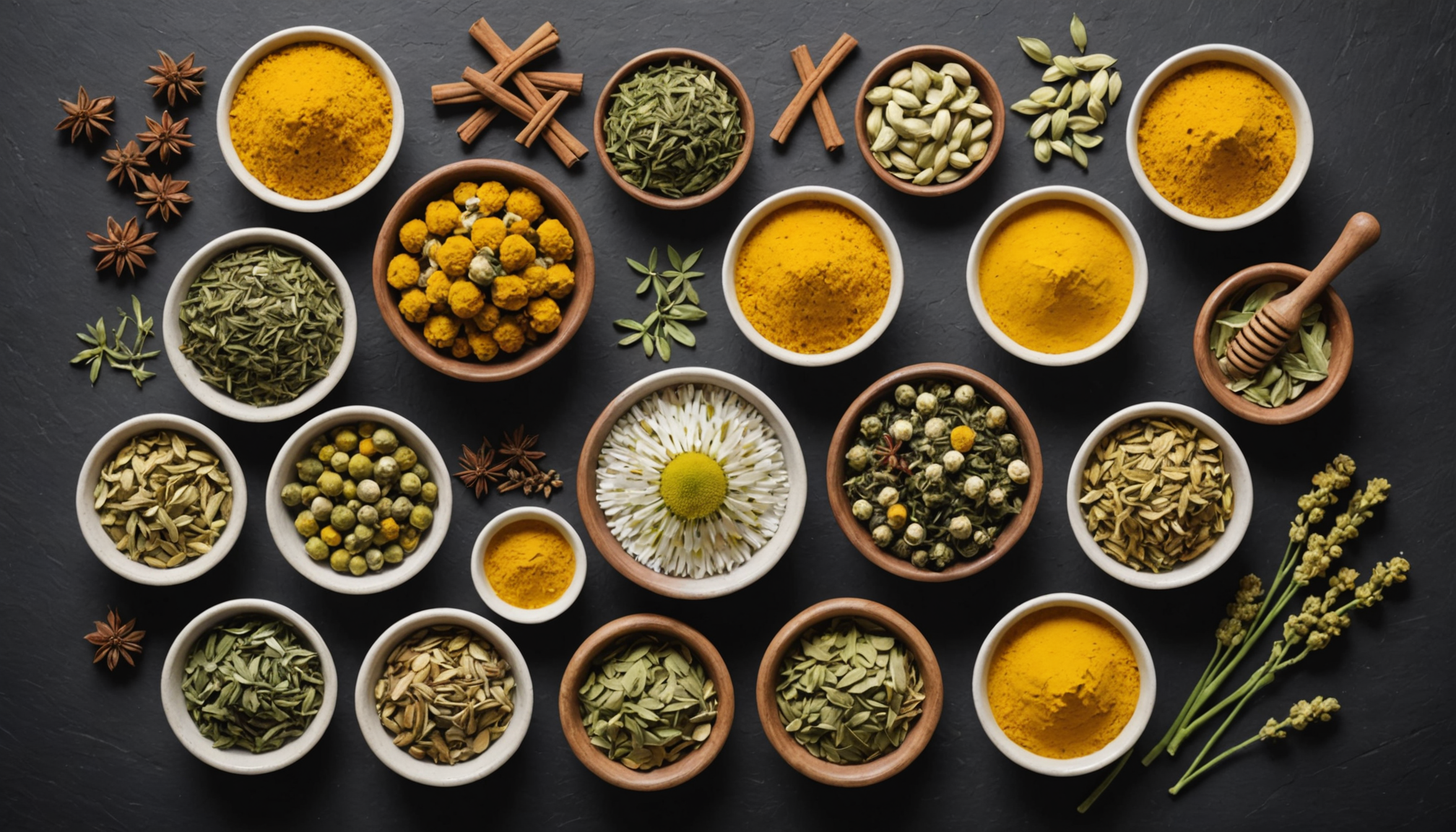Introduction to Herbal Medicine: The Power of Ancient Wisdom Meets Modern Wellness
Introduction to herbal medicine is an enlightening journey into the realm where the power of ancient wisdom meets modern wellness. Harnessing the therapeutic properties of botanicals, it is a holistic approach to health and well-being steeped in time-honored traditions, as practiced in therapies like traditional Chinese medicine and Ayurvedic medicine. The power of herbal medicine lies not just in the remedy it offers for various health conditions, healing ailments from digestive issues to inflammatory concerns, but also in its ability to promote overall well-being. These remedies, derived from natural sources like plants, have been used for centuries. Ancient civilizations, such as those of China and Egypt, utilized these powerful therapeutics prominently, demonstrating their longevity and enduring health benefits.
At the heart of herbal medicine is its holistic approach that aims to treat the root cause of the problem rather than just alleviating symptoms. This wisdom passed down through generations, strives for balance and wellness by incorporating herbal remedies into a dedicated healthcare routine. The application of ancient wisdom with modern scientific research further bolsters the credibility of this natural form of healing. One of the key advantages of herbal medicine is the wide range of health benefits it offers. It can boost the immune system, promote overall well-being, alleviate digestive issues, and even showcase anti-inflammatory properties.

However, it’s essential to consult with a qualified healthcare professional before starting any herbal regimen, especially if one has prevailing health conditions or is taking prescribed medications. The blend of traditional wisdom with modern science underscores the unique value of integrative medicine that weaves in the healing power of herbs to serve individuals and communities better.
The Healing Power of Herbs: Therapeutic Properties in Herbal Medicine
The healing power encapsulated in herbs is a testament to the unrivaled power of nature and the integral part this age-old knowledge has played in various systems of medicine throughout history. Herbal medicine, derived from plants, holds therapeutic properties that have been recognized and used by traditional healers and herbalists spanning thousands of years across different cultures. These gifted individuals harnessed the potency of botanical medicine long before modern times, treating various ailments through practices rooted in ancient healing wisdom. This traditional knowledge passed down through generations continues to serve as the backbone of herbal medicine, reminding us of the profound ties between the ancients and the organic world, with reminders of civilizations such as Egypt and China, and their abundant use of herbs. Today, with the increasing interest in alternatives to conventional medicine, herbal medicine is fast becoming a powerful tool in modern healthcare practice.
The benefits of herbal remedies extend beyond their curative potential. Herbal tea, for instance, is used to soothe digestive issues, and certain standardized herbal compounds have been studied for their potential benefits against various health concerns. The healing properties of these herbs typically have fewer side effects when used correctly and are believed to restore balance within the body. Concepts such as these and the traditional healing approach of treating the body holistically are gaining more acceptance, providing grounds for potential integration with modern healthcare.
One cannot help but marvel at how this practice aligns with the current move toward patient-centered care, highlighting the dynamism that herbal medicine promises. Echoes of traditional herbal practices reverberate continually, illustrating that the wisdom of using herbs, revered and advocated from the ancient civilizations of China to the Egyptians, surely has its place in our modern world. The past, it seems, does not fade but rather persists and evolves, offering timeless lessons amplified by the healing power rooted in nature’s offering.
Harnessing the Power of Traditional Medicine for Better Health
The concept of harnessing the power of traditional medicine for better health dates back to ancient civilizations such as China and the Egyptians, showcasing its revered longevity and efficacy. This ancient system of medicine emphasizes the holistic approach to healing, meticulously incorporating physical, psychological, and spiritual aspects of well-being. Traditional practices, in their unique ways, have played a significant role in managing diverse health conditions by focusing on the body’s innate capacity for self-healing. As the perception of health shifts, a growing number of people are turning to herbal remedies for various health concerns. This shift has significantly been influenced by the fact that these remedies are derived from plants, a natural resource that resonates with eco-conscious individuals.
Herbal medicine is a powerful tool in this traditional practice, prized for its therapeutic effects and natural attributes. It goes without saying that this style of medicine has been used extensively in civilizations such as China, which is renowned for its comprehensive and well-prescribed herbal system. Similarly, the Egyptians also have a rich history of traditional medicine usage, primarily focusing on herbs and natural remedies. Studied for its potential to provide alternatives to conventional medical treatments, herbal medicine is increasingly being embraced in today’s healthcare options.

Notable aspects of traditional medicine that continue to stand the test of time include:
- Recurrence to natural resources
- Harnessing the body’s healing potential
- Prioritization of holistic wellness
- Emphasis on preventative care
Traditional Wisdom Meets Modern Approach: The Rise of Herbal Medicinal Methods
As the modern world continues its relentless march towards progress and innovation, healthcare has not been left untouched. So much so that, conventional wisdom in the form of herbal medicinal methods is seeing a commendable resurgence and appreciation. Acknowledging the power inherent within nature, the adage, ‘herbal medicine is powerful’, is gaining added relevance in this period of scientific enlightenment. Key to this revival is the well-grounded understanding that several ancient civilizations such as the Egyptians utilized a holistic healing approach leveraging the exquisite richness of their surrounding flora. Demonstrably, these methods not only provided relief from various ailments but also minimized the potential side effects associated with synthetic drugs.
Adopting this traditional wisdom in conjunction with the convenience of modern medicinal pathways is shaping the new paradigm shift in wellness among a growing number of practitioners and patients. Here, medicine often functions more as a complement to dietary and lifestyle changes, rather than being used as the first or only option:
- Emphasizing preventive care by bolstering the body’s inherent healing capabilities
- Balancing the use of natural remedies with appropriate synthetic medications when required
- Tailoring treatments to accommodate an individual’s unique physiological characteristics
Indeed, the rise of herbal medicinal methods hails the power marriage of antiquity’s time-tested wisdom with today’s evidence-based practices promising a future of healthcare that is more integrative and patient-centric. This blend of ancient herbal traditions and modern medical research offers a more comprehensive approach to health and wellness. It recognizes the importance of natural ingredients and their synergistic effects with the human body, while also valuing the advancements in medical science for more accurate diagnosis and treatment. As a result, this holistic approach not only caters to the physical aspects of health but also considers the mental and emotional well-being of individuals, leading to more effective and sustainable health outcomes.
Conclusion
In conclusion, herbal medicine is a powerful approach to health and wellness often underappreciated in our modern world. This form of treatment, which relies heavily on natural ingredients, is deeply rooted in ancient cultures and is positioned to play an integral part in medical scenarios today. Besides being accessible and environmentally friendly, it is linked with fewer side effects as compared to pharmaceutical drugs.
Patients who embrace herbal medicine often report improvements in their overall well-being, experiencing relief from various ailments. The power of these treatments is not just anecdotal; a growing body of scientific research supports the effectiveness of botanical therapies. Despite skepticism by some on herbal remedies, the positive outcomes cannot be disregarded.
Therefore, stakeholders in the medical field have the responsibility to advocate for a more integrative healthcare system that acknowledges the potential and power of herbal medicine. As consumers continue to search for safer, cheaper, and more holistic treatments, the role of herbal medicine is bound to grow. It provides a promising avenue for innovative treatments blending time-honored wisdom with modern medical advancements.
FAQ’s:
Q1. What are the benefits of herbal medicine?
A1. Herbal medicine is a powerful form of traditional medicine that has been used for centuries to treat a variety of ailments. It has many benefits, including providing natural remedies for common illnesses, reducing the risk of side effects, and promoting overall health and wellness.
Q2. How does herbal medicine work?
A2. Herbal medicine works by using natural plant-based ingredients to treat a variety of ailments. These ingredients are combined in various ways to create remedies that can help to reduce symptoms, improve overall health, and promote wellness.
Q3. What are the most common herbs used in herbal medicine?
A3. Common herbs used in herbal medicine include chamomile, ginger, lavender, peppermint, and turmeric. These herbs have been used for centuries to treat a variety of ailments and promote overall health and wellness.
Q4. Is herbal medicine safe?
A4. Herbal medicine is generally considered safe when used as directed. However, it is important to consult with a healthcare professional before using any herbal remedies to ensure that they are safe and effective for your particular health needs.
Q5. What are the side effects of herbal medicine?
A5. Herbal medicine is generally considered safe when used as directed. However, some people may experience side effects such as nausea, headaches, or skin irritation. It is important to consult with a healthcare professional before using any herbal remedies to ensure that they are safe and effective for your particular health needs.
Q6. What are the benefits of herbal medicine compared to traditional medicine?
A6. Herbal medicine is a powerful form of traditional medicine that has been used for centuries to treat a variety of ailments. Compared to traditional medicine, herbal medicine has many benefits, including providing natural remedies for common illnesses, reducing the risk of side effects, and promoting overall health and wellness.
Q7. How can I find a qualified herbal medicine practitioner?
A7. To find a qualified herbal medicine practitioner, you can search online for practitioners in your area or ask your healthcare provider for a referral. It is important to find a practitioner who is experienced and knowledgeable in herbal medicine to ensure that you receive the best care possible.

Nina Jerkovic
Meet Nina Jerkovic, our expert on all things green and sustainable. With a keen eye for eco-friendly living, Nina shares practical tips and insights to help you navigate the world of sustainable choices. Join her on a mission to create a healthier planet through mindful living.


 Herbalism And Sustainability | Cultivating And Harvesting Medicinal Plants Responsibly
Herbalism And Sustainability | Cultivating And Harvesting Medicinal Plants Responsibly
